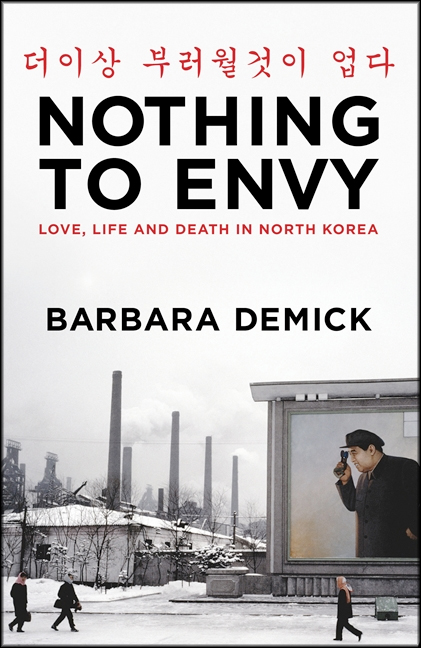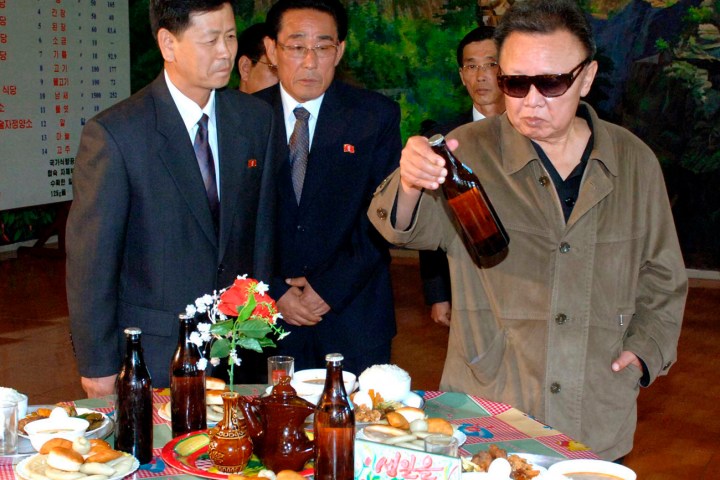Los Angeles Times correspondent Barbara Demick has just won what’s arguably the most prestigious award for literary non-fiction in the world, the Samuel Johnson Prize, for her book Nothing to Envy. By all accounts, it’s an unprecedented look at what everyday life is like in Kim Jong-Il’s People’s Republic.
In the opening chapter to her literary non-fiction masterpiece Nothing to Envy (Granta), journalist Barbara Demick uses a forceful metaphor to explain what she’s about to do in the book. The metaphor is about darkness, specifically the kind that exists in North Korea, and the revealing device of a satellite photograph is employed to make her point: a shot from space of the Far East at night, she writes, shows that while Japan, South Korea and China “fairly gleam with prosperity,” there is a large splotch in the middle “curiously lacking in light.”
Only a handful of writers have managed to shine a torch into the mysterious void that is the Democratic People’s Republic of Korea, and Demick, if the reviews and accolades are anything to go by, has done it better than most.
She creates the context early on: “North Koreans beyond middle age remember well when they had more electricity (and for that matter food) than their pro-American cousins in South Korea, and that compounds the indignity of spending their nights sitting in the dark. Back in the 1990s, the U.S. offered to help North Korea with its energy needs if it gave up its nuclear weapons program. But the deal fell apart after the Bush administration accused the North Koreans of reneging on their promises. North Koreans complain bitterly about the darkness, which they still blame on the U.S. sanctions. They can’t read at night. They can’t watch television. ‘We have no culture without electricity,’ a burly North Korean security guard once told me accusingly.”
But it’s in the human stories that articulate what it’s like to negotiate such a place that Demick’s book finds its power. Some North Koreans have learnt to love the dark, she explains. She tells of a pair of teenage lovers who would not be able to sustain a relationship were it not for the cloak of blackness that descends on the country at sunset. The pair could not be seen in public as it would destroy the girl’s reputation and the boy’s career prospects, so at night they would take long walks together. They had no set time for their assignations as nobody owned a watch, and anyway, “[the] cadence of life is slower in North Korea.”

According to the San Francisco Chronicle, the “tale of the star-crossed lovers, Jun-sang and Mi-ran, is so charming as to have inspired reports that Hollywood might be interested.” Demick, a correspondent for the Los Angeles Times, took a long time getting to this point. She was posted to Seoul eight years ago, and the inaccessibility of the north, which she intended to cover for the newspaper, intrigued her. Like any Western journalist, she’d be taken on official tours of the country where “interviews” with the locals yielded nothing more than Party slogans such as, “We have nothing to envy.”
Intent on learning what the lived experience was behind those rehearsed lines, Demick spent years interviewing North Koreans who had escaped to South Korea, and her narrative focuses on six men and women from Chongjin, a port city of 500,000 on the coast. These people have nothing to do with the standard media representations of the country; the book is not a snapshot of Kim Jong-Il or the marches in Pyongyang or the nuclear plant at Yongbyan, although these subjects do of course filter into the story. It’s instead a subtle and nuanced look at how families cope in the face of their government’s dedicated (and successful) attempt to block out the rest of the world.
Last week it was announced that Nothing to Envy won the Samuel Johnson Prize, at GBP30,000 amongst the richest and most prestigious awards for non-fiction out there. Demick beat Andrew Ross Sorkin’s Too Big to Fail, a New York Times bestseller and an outstanding work of literary non-fiction on the companies and bankers that caused the September 2008 Wall Street collapse. Evan Davis, the chair of the judges, explained why Demick deserved it: “It is the personal detail in Nothing to Envy that makes it both gripping and moving. Nowhere will you find a better account of real life in North Korea, a society that is all too easily comically typecast by massive parades of co-ordinated flag-wavers. I think we knew this book had something when we found ourselves reading it out loud to spouses and partners. And it is a real testament to Demick’s writing, that a book on such a grim topic can be so hard to put down.”
By Kevin Bloom
Read more: Excerpt of Nothing to Envy in the New York Times, San Francisco Chronicle, Reviews of Nothing to Envy
Main photo: North Korean leader Kim Jong-il (R) holds a bottle during his visit to the Namheung Youth Chemistry Combination Company at an undisclosed place in North Korea in this undated picture released by North Korea’s official news agency KCNA June 7, 2010. KCNA did not state when the picture was taken. North Korea’s parliament meets for a rare second annual session on Monday amid growing momentum in the international community to punish Pyongyang for the sinking of a South Korean navy ship in March that killed 46 sailors. REUTERS/KCNA



















 Become an Insider
Become an Insider